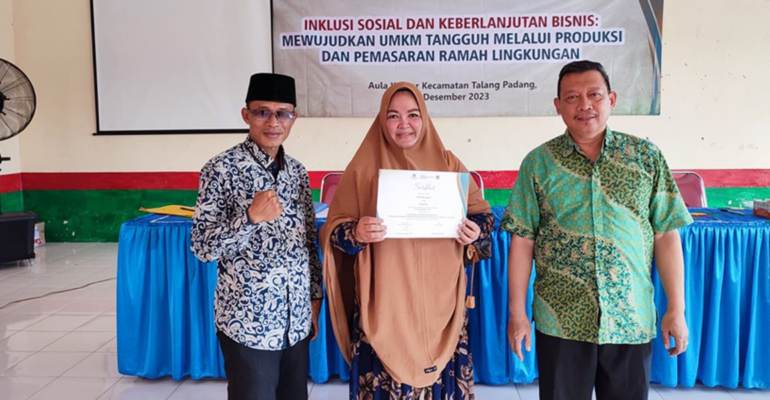Thanks to the IPB Dosen Mengabdi Inovasi Programme, MSMEs in Talang Padang are Ready to Have a Halal Certificate

Micro, small and medium enterprises (MSMEs) in Talang Padang District, Tanggamus, Lampung participated in training on halal certification requirements and processes organised by the IPB University Dosen Mengabdi Inovasi team. The training was attended by 18 MSME players who have a variety of processed snack products such as chips, basreng, pastries, wet cakes, sugar ants and others.
According to Dr Ahyar Ismail, leader of the Dosen Mengabdi Inovasi team, this training is important considering the plan to establish halal certification obligations by the government in 2024. The halal certification obligation will apply to all levels of business actors, both MSMEs and large industries.
“The determination of halal certification obligations will begin for food products, beverages, slaughter products and services, raw materials, food additives and auxiliary materials for food and beverage products,” he explained.
The Innovation Service Lecturer team also consists of Tursina Andita Putri, SE, MSi and Danang Pramudita, SP, MSi. In addition, this training also presented a resource person Tusrizal, SPd, SH as an Islamic religious instructor and companion to the halal product process in Tanggamus Regency.
“This activity is a tangible form of IPB University’s contribution to be involved in the community empowerment process. The training focuses on the mechanism, requirements and process of registering halal certification,” said Danang Pramudita.
In general, MSMEs are encouraged to register for halal certification through the self-declaration route which is intended for MSMEs and at no cost (free) through the ‘Free Halal Certification’ (Sehati) programme.
He said that the participants were very enthusiastic in participating in the training. The majority of them do not know the obligation for halal certification for MSMEs.
“So far, MSME players think that the halal certification process is difficult and the costs are high so they are unable to carry out this process. Even though there is an option for a self-declaration path with the help of a halal companion that can be utilised,” he explained.
Furthermore, he revealed that there are several requirements for MSME players in participating in the halal certification process. One of them is the main requirement such as the Business Identification Number (NIB).
Other requirements that need to be met are products that are not risky and ingredients are definitely halal, simple production processes, turnover below 500 million, separate production locations from non-halal processes, and do not use hazardous materials.
“Business actors need to register first through an online system at ptsp.halal.go.id while communicating with halal assistants in each district. After the requirements are complete, the halal product process assistants will carry out verification and validation,” explained Tusrizal when explaining the halal certification process.
The results of verification and validation are then forwarded to the Halal Product Guarantee Agency (BPJPH) by system. After that, there will be a fatwa hearing of the Indonesian Ulema Council (MUI) to determine the halalness of the product. When all processes have been completed, a halal certificate and logo will be issued.
The MSME players hope that they can continue to communicate with the resource person when they are ready for the halal certification process. On the other hand, they continue to try to follow the obligations set by the government, including the obligation of halal certification. They realise that MSME products must meet good standards so that they will increasingly get a wider market reach. (*/Rz) (IAAS/RUM)



